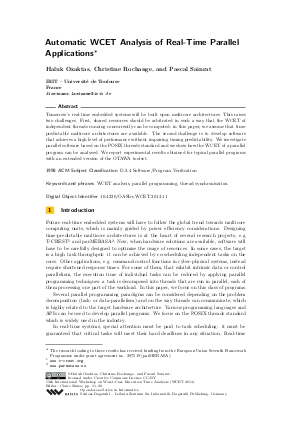Automatic WCET Analysis of Real-Time Parallel Applications
Authors Haluk Ozaktas, Christine Rochange, Pascal Sainrat
-
Part of:
Volume:
13th International Workshop on Worst-Case Execution Time Analysis (WCET 2013)
Part of: Series: Open Access Series in Informatics (OASIcs)
Part of: Conference: Workshop on Worst-Case Execution Time Analysis (WCET) - License:
 Creative Commons Attribution 3.0 Unported license
Creative Commons Attribution 3.0 Unported license
- Publication Date: 2013-07-08
File

PDF
OASIcs.WCET.2013.11.pdf
- Filesize: 0.66 MB
- 10 pages
Document Identifiers
Subject Classification
Keywords
- WCET analysis
- parallel programming
- thread synchronisation
Metrics
- Access Statistics
-
Total Accesses (updated on a weekly basis)
0PDF Downloads0Metadata Views
Abstract
Tomorrow's real-time embedded systems will be built upon multicore architectures. This raises two challenges. First, shared resources should be arbitrated in such a way that the WCET of independent threads running concurrently can be computed: in this paper, we assume that timepredictable multicore architectures are available. The second challenge is to develop software that achieves a high level of performance without impairing timing predictability. We investigate parallel software based on the POSIX threads standard and we show how the WCET of a parallel program can be analysed. We report experimental results obtained for typical parallel programs with an extended version of the OTAWA toolset.
Cite As Get BibTex
Haluk Ozaktas, Christine Rochange, and Pascal Sainrat. Automatic WCET Analysis of Real-Time Parallel Applications. In 13th International Workshop on Worst-Case Execution Time Analysis. Open Access Series in Informatics (OASIcs), Volume 30, pp. 11-20, Schloss Dagstuhl – Leibniz-Zentrum für Informatik (2013)
https://doi.org/10.4230/OASIcs.WCET.2013.11
BibTex
@InProceedings{ozaktas_et_al:OASIcs.WCET.2013.11,
author = {Ozaktas, Haluk and Rochange, Christine and Sainrat, Pascal},
title = {{Automatic WCET Analysis of Real-Time Parallel Applications}},
booktitle = {13th International Workshop on Worst-Case Execution Time Analysis},
pages = {11--20},
series = {Open Access Series in Informatics (OASIcs)},
ISBN = {978-3-939897-54-5},
ISSN = {2190-6807},
year = {2013},
volume = {30},
editor = {Maiza, Claire},
publisher = {Schloss Dagstuhl -- Leibniz-Zentrum f{\"u}r Informatik},
address = {Dagstuhl, Germany},
URL = {https://drops.dagstuhl.de/entities/document/10.4230/OASIcs.WCET.2013.11},
URN = {urn:nbn:de:0030-drops-41186},
doi = {10.4230/OASIcs.WCET.2013.11},
annote = {Keywords: WCET analysis, parallel programming, thread synchronisation}
}
